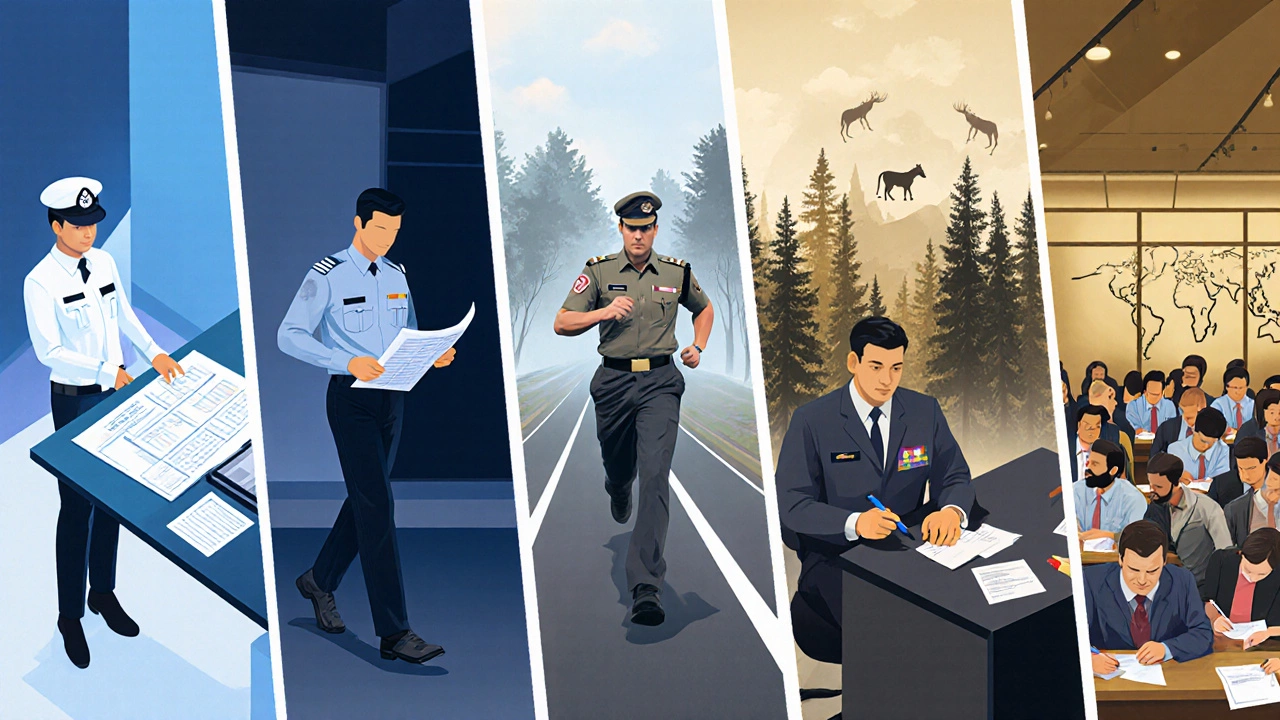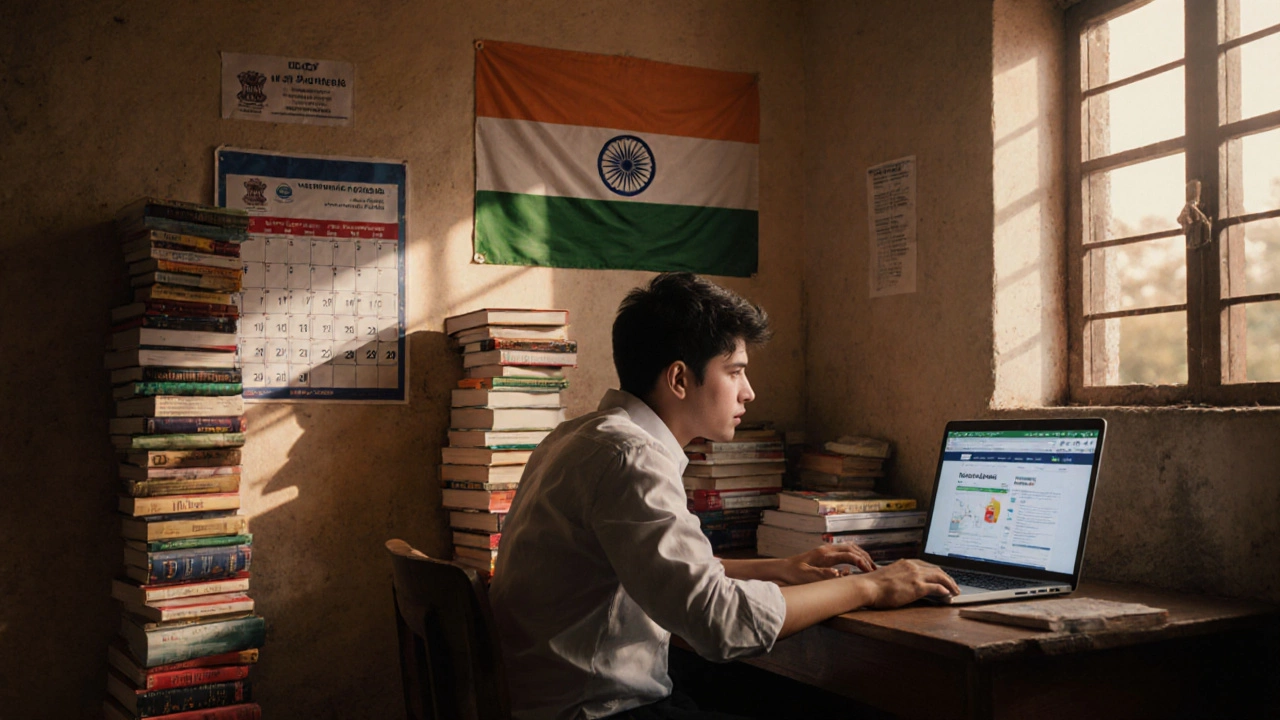Government Exam Preparation Calculator
How Long Do You Need to Prepare?
Find your personalized preparation timeline for India's toughest government exams based on your background and study habits.
Ever wondered which government job makes candidates wish they’d chosen a different career? The answer isn’t just about salary or prestige - it’s about the sheer amount of effort, time, and mental stamina required to even get the job. Below we break down the hardest government posts, why they’re so demanding, and how you can tackle them without burning out.
How We Measure Difficulty
Before naming the toughest roles, we needed a fair way to compare them. Here’s the checklist we used:
- Selection Ratio: Candidates who appear versus those who finally get selected.
- Exam Complexity: Number of papers, syllabus breadth, and question style.
- Preparation Time: Average months of dedicated study reported by successful candidates.
- Responsibility Level: Decision‑making power and impact on public policy.
- Physical & Medical Requirements: Any mandatory fitness tests or health standards.
Each job got a score out of 10 for every factor, then we averaged the numbers. The higher the score, the tougher the job.
1. Indian Administrative Service (IAS)
The IAS tops our list. Managed by the Union Public Service Commission (UPSC), the civil services exam has three stages - Preliminary, Mains, and an Interview - covering everything from Indian polity to ethics and optional subjects. The selection ratio hovers around 0.1% (roughly 1 in 1,000). Successful officers become the administrative backbone of the nation, handling district development, crisis management, and policy implementation.
2. Indian Police Service (IPS)
Also chosen through the UPSC Civil Services Examination, the IPS demands a blend of academic mastery and physical fitness. After the written phase, candidates undergo a rigorous physical standards test and a demanding interview that assesses leadership under pressure. The role involves policing, intelligence, and law‑and‑order management at district and state levels. The selection ratio is roughly 0.15%.
3. Indian Forest Service (IFS)
The IFS focuses on forest conservation, wildlife protection, and climate‑change mitigation. While it shares the UPSC exam, the optional subjects often include environmental science, botany, or zoology, making the syllabus uniquely technical. After selection, officers face field postings in remote, sometimes rugged terrains, adding a physical endurance component. Selection ratio sits at about 0.2%.

4. Indian Revenue Service (IRS)
The IRS handles tax collection, customs, and fiscal policy enforcement. Candidates clear the same UPSC exam, but the optional subjects usually tilt towards economics, public administration, or law, demanding strong analytical skills. Post‑selection training includes intensive modules on tax law, audit procedures, and international finance. The selection ratio is close to 0.25%.
5. Staff Selection Commission (SSC) CGL
While not as elite as the UPSC cadre, the SSC Combined Graduate Level (CGL) exam is notorious for its massive applicant pool - over 2 million each year - and a low vacancy count (around 3,000). The exam spans five tiers, including English comprehension, quantitative aptitude, and a skill‑based paper. The selection ratio is roughly 0.15%, making it a relentless marathon for graduates.
Why These Jobs Are So Tough
Everyone wonders what makes these positions a cut above the rest. The key factors are:
- Broad Syllabus: From ancient Indian history to cutting‑edge technology, the UPSC covers every possible topic.
- Multiple Stages: Candidates must clear prelims, mains, and interviews - each testing different skill sets.
- Intense Competition: Millions of aspirants vie for a handful of slots.
- Physical & Medical Tests: IPS and certain IFS postings demand fitness standards that add a whole new preparation layer.
- High Responsibility: Once in service, decisions affect millions of lives, so the selection process is designed to filter only the most capable.
Effective Preparation Strategies for the Hardest Jobs
Cracking any of these exams isn’t magic; it’s systematic work. Here’s a roadmap that works for most successful candidates:
- Start Early: Begin at least 18 months before the exam date. Early starters can spread the massive syllabus into manageable chunks.
- Choose the Right Optional Subject: Pick a subject that aligns with your undergraduate background or one you enjoy. This can boost scores by 5‑10 marks.
- Build a Timetable: Allocate 6‑8 hours daily, with dedicated slots for current affairs, answer writing, and mock tests.
- Use Trusted Resources: NCERT books for basics, newspaper for current affairs, and standard guides like "Laxmikanth" for polity.
- Practice Answer Writing: For mains, quality beats quantity. Write 1‑2 answers daily, then review with a mentor.
- Physical Training (for IPS/IFS): Include cardio, strength training, and a weekly fitness test simulation.
- Mock Exams: Take full‑length tests every 4‑6 weeks to gauge progress and adjust the timetable.
- Stay Healthy: Regular sleep, balanced diet, and short breaks prevent burnout.
Following this plan doesn’t guarantee a rank, but it dramatically raises your odds compared to ad‑hoc study.
Comparison of the Toughest Government Jobs
| Job | Exam Difficulty (1‑10) | Selection Ratio | Typical Prep Time (months) | Starting Salary (₹/yr) |
|---|---|---|---|---|
| Indian Administrative Service (IAS) | 9.5 | 0.1% | 18‑24 | 56,100 |
| Indian Police Service (IPS) | 9.0 | 0.15% | 18‑20 | 56,100 |
| Indian Forest Service (IFS) | 8.8 | 0.2% | 16‑20 | 56,100 |
| Indian Revenue Service (IRS) | 8.5 | 0.25% | 16‑22 | 56,100 |
| SSC CGL | 8.0 | 0.15% | 12‑14 | 45,000 |
Common Pitfalls and How to Avoid Them
Even the brightest aspirants stumble. Here are the usual mistakes and quick fixes:
- Over‑reliance on One Source: Diversify. Use NCERT, reputable reference books, and current affairs magazines.
- Neglecting Answer Writing: For mains, practice daily. Use a timer to simulate exam pressure.
- Skipping Physical Training (IPS/IFS): Incorporate a fitness schedule early; don’t wait until the final month.
- Burnout: Schedule short breaks, hobbies, and weekly rest days.
- Ignoring Interview Skills: Attend mock interviews or join a coaching class that offers personality development.
Quick Checklist Before You Start
- Identify the target job and its exam pattern.
- Choose an optional subject you’re comfortable with.
- Set a realistic timeline (minimum 12‑24 months).
- Gather core study material (NCERT + standard reference).
- Plan daily study hours and stick to them.
- Include physical fitness if applying for IPS/IFS.
- Schedule periodic mock tests and answer‑writing sessions.
- Maintain a health routine: sleep 7‑8 hrs, balanced meals, short walks.
Frequently Asked Questions
Which government job has the lowest selection ratio?
The Indian Administrative Service (IAS) tops the list with a selection ratio of about 0.1%, meaning roughly one in a thousand candidates secures a seat.
Can I prepare for the UPSC exams while working full‑time?
Yes, many successful candidates balance a job and study. The key is a disciplined schedule-usually 3‑4 hours on weekdays and longer sessions on weekends.
Do I need a science background for the Indian Forest Service?
A science background helps, especially for optional subjects like Botany or Zoology, but it’s not mandatory. Candidates from humanities can choose subjects like Geography or Environmental Science.
How important is the interview for IAS selection?
The interview (also called the Personality Test) carries 275 marks out of 1,075 total. A strong performance can boost your rank dramatically, while a weak one can drop you several hundred places.
What’s the best way to stay updated on current affairs?
Read a reputable national newspaper (like The Hindu or Indian Express) daily, supplement with a monthly current‑affairs magazine, and use an app that aggregates government releases and Supreme Court judgments.
If you’re ready to take on the toughest government job challenge, start with a clear plan, use the right resources, and keep your health in check. The journey is long, but the reward-shaping the nation and a secure career-makes every hour of study worthwhile.





